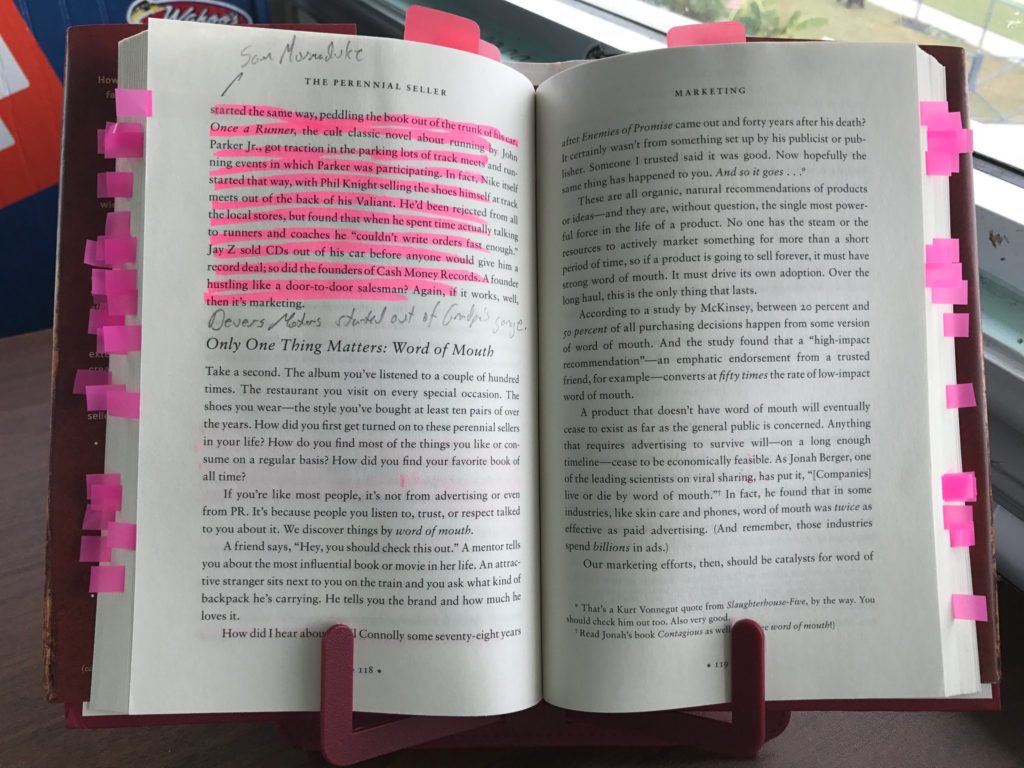As a 5-year-old kindergarten student, I visited the principal’s office on a weekly basis. When the call came over the intercom to summon me there, I was excited to go. Every trip was the same. I’d be ushered in, handed a book, and read it to our school’s principal. Most of the time it was a children’s storybook, but sometimes he would ask me to read him an article from the newspaper. He was a lifelong educator and enjoyed the novelty of having a kindergartener read to him. I wasn’t exactly reading War & Peace, but it was a few levels above “See Dick run.” Plus it got me out of class, which I appreciated even then.
I learned to read when I was three. My mom found out the hard way. She was talking to my grandma about Christmas presents and because I was in the room, decided to spell mine out. “I got Mike a T-O-N-K-A, T-R-U-C-K.” Unable to contain my excitement as that was exactly what I had asked for, I shouted out, “I’m getting a Tonka Truck!” My mom blurted out a scolding, “Michael Wayne!” before she fell into a fit of laughter as she realized what had just happened.
This reading habit has stuck with me for well over 45 years now, and in the past several months a sad realization dawned on me.
I’ve wasted a lifetime of reading.
In fairness, “wasted” is overstating it a bit. Books have been my passion over the course of my entire life, and the joy I get from reading couldn’t possibly be replaced or even overstated. But I haven’t maximized my reading the way I could have or the way I’ve learned to over the past six months.
As I read, I highlight significant passages and bookmark pages, sometimes even adding marginalia (marks, scribbles, comments, and other notes made in the margins of a book). It’s enjoyable to pick up a book a few years after I’ve read it and skim back through the highlights and scribbles and remember why a certain passage struck me or seemed worthy of a comment. But in the past, that’s where the efforts would end. A curiosity.
Through author Ryan Holiday (who learned it from author Robert Greene while serving as his research assistant), I learned that these bookmarks, highlights, and marginalia are treasures that I’ve left lying around like trinkets. This valuable data now forms the basis of my own personal database. Though still in its infancy, I already use it regularly.
After I finish a book, I now go back and record all of the highlighted passages (along with any corresponding notes I made in the margins) into a note in Evernote. I include the book’s title, author, and page number in case I want to go back and check the context at a later date. Here’s an example of one of my notes:
https://www.evernote.com/l/ASRq9R41W1JElqH2nYNqQDZMRzhb6e6zo6Q
Whereas Holiday and Greene both enter their notes on physical index cards, I prefer to use Evernote. It has the advantage of making every bit of text in the note searchable. I can also add tags to each note which enables me to include keywords that may not appear in the note itself or to categorize each note in any way I choose.
Being able to go back and review highlighted passages by a keyword in mere seconds is not only incredibly valuable to me whenever I’m writing, it’s also fun.
Here’s another example. I searched my Card Deck notebook for the word “learn”:

The search returned 23 different notes that contain the word “learn.” You may also notice that I added “perspective” as a tag to the note with the Epictetus quote as I wanted to be able to see that quote again if I was ever writing or referring to a topic that included perspective.
Starting back in May of this year, I made a change to the way I’m adding these book notes to my database. And it’s a little bit surreptitious.
I’ve bribed and conned my own daughter.
Unlike her father, reading is not exactly her favorite. So I’m overpaying her to enter the notes for me. As a result, I’m handing over many times more than I originally paid for my books in order for her to skim them. For example: I paid $13.65 for Robert Greene’s the 48 Laws of Power. My daughter entered 53 separate notes from that book for me for a total of $73. All of which means the book has actually now cost me $86.65. Worth every single penny and then some.
Having my daughter enter the notes (I do go back and review them afterwards and make any necessary corrections as my handwriting is awful and she can’t be expected to transcribe my notes with any accuracy), gives me twice the benefit of entering them myself. Not only am I conning her into reading, I’m paying her to read and interact with (which increases retention significantly) books and passages I consider remarkable. And it’s working. She is now reading more on her own, and I’ve already overheard her reference one of the notes during a conversation with someone else.
It also gives her some extra spending money as she enters her first year of college so that relieves a little bit of the guilt from my clandestine purpose. But if you don’t mind, please don’t send her this link. I still have about 20 more books I need her to enter before she catches on.
# # #
Here are some links to other related posts:
Robert Greene’s method of writing books
A short history of the index card
Thomas Jefferson’s Commonplace Book (or one of them; he had several)




0 Comments